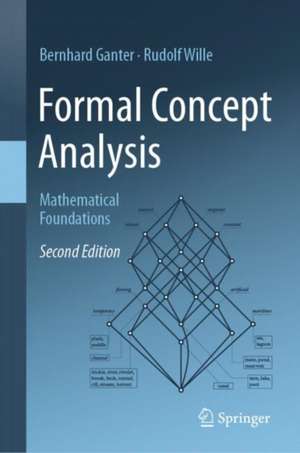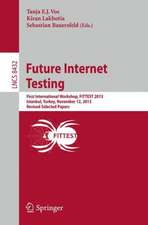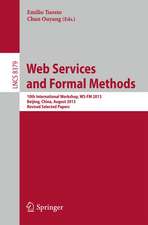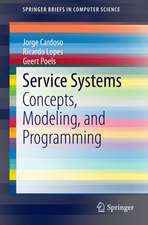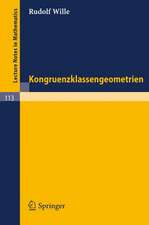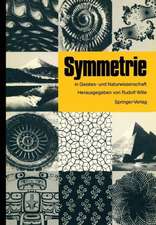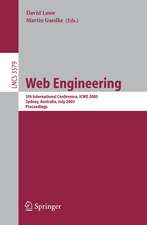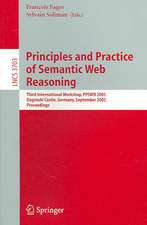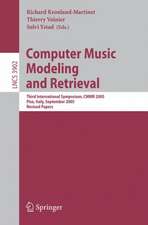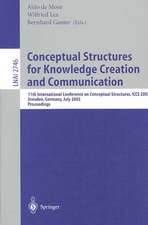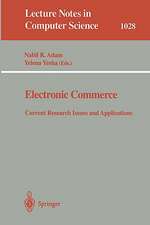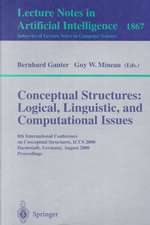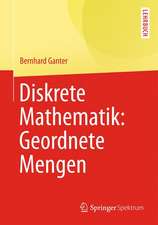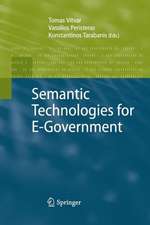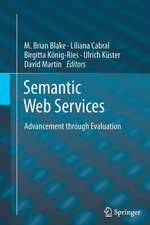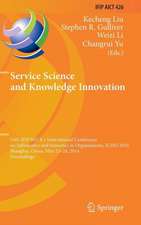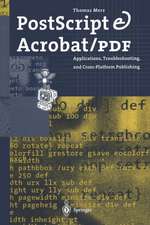Formal Concept Analysis: Mathematical Foundations
Autor Bernhard Ganter, Rudolf Willeen Limba Engleză Hardback – 18 sep 2024
Since then, Formal Concept Analysis has fully emerged, sparking a multitude of publications for which the first edition of this textbook established itself as the standard reference in the literature, with a total of 10000+ citations. This is the second edition, revised and extended, of the textbook published originally in German (1996) and translated into English (1999), giving a systematic presentation of the mathematical foundations while also focusing on their possible applications for data analysis and knowledge processing. In times of digital knowledge processing, formal methods of conceptual analysis are gaining in importance. The book makes the basic theory for such methods accessible in a compact form, and presents graphical methods for representing concept systems that have proved themselves essential in communicating knowledge.
The textbook complements each chapter with further notes, references and trends, putting the work in modern context and highlighting potential directions for further research. Additionally, the book contains an entirely new chapter on contextual concept logic, including a section on description logics and relational concept analysis. As such, it should be a valuable resource for students, instructors and researchers at the crossroads of subject areas like Applied and Discrete Mathematics, Logics, Theoretical Computer Science, Knowledge Processing, Data Science, and is meant to be used both for research and in class, as a teaching resource.
| Toate formatele și edițiile | Preț | Express |
|---|---|---|
| Paperback (1) | 532.12 lei 6-8 săpt. | |
| Springer Berlin, Heidelberg – 4 dec 1998 | 532.12 lei 6-8 săpt. | |
| Hardback (1) | 400.03 lei 6-8 săpt. | |
| Springer Nature Switzerland – 18 sep 2024 | 400.03 lei 6-8 săpt. |
Preț: 400.03 lei
Preț vechi: 500.03 lei
-20% Nou
Puncte Express: 600
Preț estimativ în valută:
76.55€ • 79.47$ • 63.83£
76.55€ • 79.47$ • 63.83£
Carte tipărită la comandă
Livrare economică 22 martie-05 aprilie
Preluare comenzi: 021 569.72.76
Specificații
ISBN-13: 9783031634215
ISBN-10: 3031634217
Pagini: 350
Ilustrații: Approx. 350 p.
Dimensiuni: 155 x 235 mm
Greutate: 0.71 kg
Ediția:Second Edition 2024
Editura: Springer Nature Switzerland
Colecția Springer
Locul publicării:Cham, Switzerland
ISBN-10: 3031634217
Pagini: 350
Ilustrații: Approx. 350 p.
Dimensiuni: 155 x 235 mm
Greutate: 0.71 kg
Ediția:Second Edition 2024
Editura: Springer Nature Switzerland
Colecția Springer
Locul publicării:Cham, Switzerland
Cuprins
Preface to the first edition.- Preface to the second edition.- Acknowledgements.- 0. Order-theoretic foundations.- 1. Concept lattices of formal contexts.- 2. Determination and representation.- 3. Parts, factors, and bonds.- 4. Decompositions of concept lattices.- 5. Constructions of concept lattices.- 6. Properties of concept lattices.- 7. Context comparison and conceptual measurability.- 8. Contextual concept logic.- References.- Formal contexts and concept lattices in this book.- Index.
Notă biografică
Bernhard Ganter is Emeritus Professor of Mathematics at Technische Universität Dresden, Germany. His main research field is Formal Concept Analysis. Before being appointed to Dresden in 1993, he was a member of R. Wille’s working group and contributed to the development of Formal Concept Analysis. He is co-founder of the “Mathematics Adventure Land” exhibition in Dresden, which has been a success since 2008.
Rudolf Wille (2 November 1937 – 22 January 2017) was professor of Mathematics (General Algebra) from 1970 to 2003 at Technische Universität Darmstadt, Germany. He is cofounder of the celebrated theory of Formal Concept Analysis, a field of mathematics that applies mathematical lattice theory to organize data based on objects and their shared attributes. An accomplished musician, he also made contributions to Mathematics in Music, Mathematical Pedagogy and the Philosophy of Science, and was a leading scholar in the concept lattice research community.
Rudolf Wille (2 November 1937 – 22 January 2017) was professor of Mathematics (General Algebra) from 1970 to 2003 at Technische Universität Darmstadt, Germany. He is cofounder of the celebrated theory of Formal Concept Analysis, a field of mathematics that applies mathematical lattice theory to organize data based on objects and their shared attributes. An accomplished musician, he also made contributions to Mathematics in Music, Mathematical Pedagogy and the Philosophy of Science, and was a leading scholar in the concept lattice research community.
Textul de pe ultima copertă
Formal Concept Analysis is a field of applied mathematics based on the mathematization of concept and conceptual hierarchy. It thereby activates mathematical thinking for conceptual data analysis and knowledge processing. The underlying notion of “concept” evolved early in the philosophical theory of concepts and still has effects today. In mathematics it played a special role during the emergence of mathematical logic in the 19th century. Subsequently, however, it had virtually no impact on mathematical thinking. It was not until 1979 that the topic was revisited and treated more thoroughly.
Since then, Formal Concept Analysis has fully emerged, sparking a multitude of publications for which the first edition of this textbook established itself as the standard reference in the literature, with a total of 10000+ citations. This is the second edition, revised and extended, of the textbook published originally in German (1996) and translated into English (1999), giving a systematic presentation of the mathematical foundations while also focusing on their possible applications for data analysis and knowledge processing. In times of digital knowledge processing, formal methods of conceptual analysis are gaining in importance. The book makes the basic theory for such methods accessible in a compact form, and presents graphical methods for representing concept systems that have proved themselves essential in communicating knowledge.
The textbook complements each chapter with further notes, references and trends, putting the work in modern context and highlighting potential directions for further research. Additionally, the book contains an entirely new chapter on contextual concept logic, including a section on description logics and relational concept analysis. As such, it should be a valuable resource for students, instructors and researchers at the crossroads of subject areas like Applied and Discrete Mathematics, Logics, Theoretical Computer Science, Knowledge Processing, Data Science, and is meant to be used both for research and in class, as a teaching resource.
Since then, Formal Concept Analysis has fully emerged, sparking a multitude of publications for which the first edition of this textbook established itself as the standard reference in the literature, with a total of 10000+ citations. This is the second edition, revised and extended, of the textbook published originally in German (1996) and translated into English (1999), giving a systematic presentation of the mathematical foundations while also focusing on their possible applications for data analysis and knowledge processing. In times of digital knowledge processing, formal methods of conceptual analysis are gaining in importance. The book makes the basic theory for such methods accessible in a compact form, and presents graphical methods for representing concept systems that have proved themselves essential in communicating knowledge.
The textbook complements each chapter with further notes, references and trends, putting the work in modern context and highlighting potential directions for further research. Additionally, the book contains an entirely new chapter on contextual concept logic, including a section on description logics and relational concept analysis. As such, it should be a valuable resource for students, instructors and researchers at the crossroads of subject areas like Applied and Discrete Mathematics, Logics, Theoretical Computer Science, Knowledge Processing, Data Science, and is meant to be used both for research and in class, as a teaching resource.
Caracteristici
This is the second edition of the popular textbook published in German (1996) and English (1999), with 10000+ citations Sets the mathematical foundations of Formal Concept Analysis, with applications to data analysis or knowledge processing Presents, in a compact exposition, numerous examples at play, complementing each chapter with notes and references
